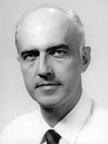Homeless
Atheist Leaves Behind Surprise: $4 Million! -
From NPR.org
 Every day on NPR, listeners hear funding credits — or,
in other words, very short, simple commercials. Every day on NPR, listeners hear funding credits — or,
in other words, very short, simple commercials.
A few weeks ago, a new one made it to air: "Support
for NPR comes from the estate of Richard Leroy Walters,
whose life was enriched by NPR, and whose bequest seeks
to encourage others to discover public radio."
NPR's Robert Siegel wondered who Walters was. So Siegel
Googled him.
An article in the online newsletter of a Catholic mission
in Phoenix revealed that Walters died two years ago at
the age of 76. He left an estate worth about $4 million.
Along with the money he left for NPR, Walters also left
money for the mission.
But something distinguished Walters from any number of
solvent, well-to-do Americans with seven-figure estates:
He was homeless.
Walters was a retired engineer from AlliedSignal Corp.;
an honors graduate of Purdue with a master's degree;
and a Marine. Walters never married, didn't have children
and was estranged from his brother. But he wasn't friendless.
Rita Belle, a registered nurse, met Walters at a senior
center 13 years ago.
"He always came in with a little backpack on and
a cap on," Belle tells Siegel. "And always
kind of looked at me, but [was] very reserved. And I'm
very outgoing
and outspoken. So I said to him, 'Hey, you got a minute
can we sit down to visit?' And we'd have coffee there
at the senior center."
Belle and Walters became friends. Belle stayed with Walters
when he was ill. She became his nurse and ultimately
the executor of his estate — as well as one of
the beneficiaries — despite fundamental differences
between them.
"He was an atheist and I'm a very profound practicing
Catholic, and I'd never met an atheist," Belle says. "And
that just blew my mind that somebody could not believe
in the Lord."
Belle volunteers at the mission in Phoenix, which like
NPR and several other nonprofits got about $400,000 from
Walters.
Belle knew him as a very well-informed man who could
fix her air conditioning — someone she just assumed
had a place to live. Then he told her that he had no
home. She heard that he slept on the grounds of the senior
center. He told her he ate at the hospital and used a
telephone there or at the center.
"And I'm sure that's when he was making his trades
and so on," Belle says. "He was involved in
investing; we talked investments a lot." Belle says
Walters even did his own income taxes.
When Walters retired, he evidently retired from the world
of material comforts. He didn't have a car.
"He just gave up all of the material things that
we think we have to have," Belle says. "You
know, I don't know how we gauge happiness. What's happy
for you
might not be happy for me. I never heard him complain."
Evidently, among his few possessions was a radio. Hence
those announcements listeners hear now and again on NPR
stations. |
|
|